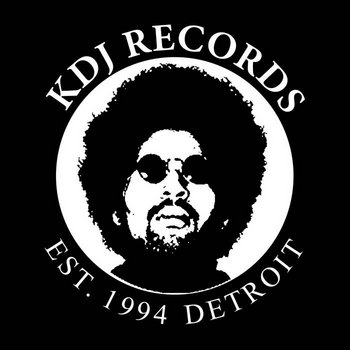
Moodymann, aka Kenny Dixon Jr., has been dropping dancefloor staple 12-inches and woozy full-length records since the Clinton administration, most of them rarely available outside of the 313 area code. He has peers in the likes of Theo Parrish, Rick Wilhite, and Marcellus Pittman, but most telling is that Dixon used to rub elbows with the likes of J. Dilla in local record shops. Both of their approaches to utilizing samples and the MPC to drastically reconfigure, rip-up, and reimagine a groove is without parallel, knowing when to switch it up and when to let it ride. As he famously told an interviewer: “My bitches and my hoes is my MPCs, my SP-1200, my bass, my keyboards.”
An enigmatic masked man operating in the shadows of the DJ booth, Dixon’s singular take on dusty, sample-based house music has had not just an outsized impact on electronic music—see the production work of respected electronic producers like Four Tet, Caribou, and Motor City Drum Ensemble, for example—but also cropped up in the hip-house stylings of newcomers like Channel Tres. And then of course, there was the time when Drake himself sampled the Detroit musician.
Drawing on an encyclopedic and eclectic knowledge of music, Dixon’s music is rooted in Motown soul, disco, jazz, electro, Prince’s discography, acid, techno, gospel, folk, and more (as his already legendary DJ Kicks mix can attest). Rather than favor the crisp, mechanistic perfection of house music, KDJ gravitates towards the homely: crackling vinyl, scuffed work boots, a flat tire on an old Cutlass. His best tracks keep that familiar kick of house music, but he plays it like jazz swing, eschewing the grid to playfully lag behind the beat or layering samples so that it sounds like a party conversation is happening. Dixon’s catalog is as deep as his crates, so here are a few selections to introduce you to the ever elusive Moodymann.
“I Can’t Kick This Feeling When It Hits”
Silentintroduction


Chic not only defined disco in the 1970’s, but hip-hop soon after. During the ‘90s and early ‘00s, Nile Rodgers’s classic disco outfit had been revived and flipped into multiple hip-hop and R&B hits by the likes of Diddy (“Mo Money Mo Problems,” “No More Drama”) and Will Smith (“Gettin’ Jiggy Wit It”). Leave it to Dixon to find a delectable little line in an incredibly well-worn hit, massaging it until it becomes mesmerizing. This ecstatic track showcases the beauty of a disco edit that is instantly familiar, yet presented in a way that feels wholly new.
“Lyk U Used 2”
Moodymann
Moodymann’s 2014 album reintroduced the producer to a new generation of listeners, finding him at his deepest, strangest, and most mischievous, as well as his catchiest. The album’s sweetest moment is this track featuring the quicksilver drumming of fellow DJ and producer Andrés, who adds the crackling triplets and skittering cymbals. A blurry, giddy track as Moody croaks about a love turned sour, this song is ideally suited for one of his legendary roller-skating parties.
“Wednesday Night People”
FOREVERNEVERMORE
This track is a ritualistic-sounding slice of house. The rhythm is driven by a Latin-tinged beat with plenty of crackling snares and additional percussion in addition to so many delicate sounds at play: bird calls, a languid piano run, a close-whispered urge to “keep on,” and a sublime humming in the distance. Then there’s Dixon’s own muffled admonition at the end. At only three minutes, it’s eminently replayable.
“Holiday”
Black Mahogani
“Shades of Jae” is the track from this 2004 album, but the opening track, “Holiday,” sets the scene for what’s to come. It percolates with Latin percussion, psychedelic flourishes, and deep bass, which commingle with an array of voices and whoops that come from every corner of the song. “Holiday” feels like a backyard BBQ with a lil somethin’ extra in the punch on a three-day weekend that’s about to pop off.
“When She Follows”
Black Mahogani 2
If you listen close to Dixon’s most entrancing dance cuts, there’s always been a jazz sensibility lurking behind the booming bass, swinging around the 4/4, and allowing little flourishes to blossom between the beats. But his jazz chops come to the fore on this expansive piece, which sounds like a live session with a full band rather than a producer hunched over his sampler. Full of sinewy walking bass, shuffling snares, simmering hi-hats, and whispered vocals, it’s all topped by a roving Rhodes organ that makes the whole thing levitate.
“Silence in the Secret Garden”
Silence in the Secret Garden
From one of Dixon’s lesser-known and more subtle albums, the title track is a beguiling stew of conflicting moods—a gurgling acid line, militant kick and incessant hi-hats propel the beat. Then there’s the swirling chimes, soon joined by smooth jazz saxophone and gleaming piano runs, which make for one of the most curious cuts in his discography.
“I Think of Saturday”
Sinner
Sinner is somewhat of a mystery in Dixon’s discography. There was supposed to be a new album back in 2018, only it never arrived (unless you wound up at the one birthday party in Detroit where he was giving them away). In its stead appeared this double pack, featuring some of his heaviest house tracks in a number of years. Built up from a blistering Linn drum beat and hand percussion, “I Think of Saturday” is Dixon at his driving best. His close-mic’d vocal delivery vacillates between blasé and frantic, searching for a lost love. And that swan dive into Joe Simon’s “With You in Mind” makes for the perfect grace note, a body-moving track with a pensive, psychological edge to it.
“Sloppy Cosmic”
Moodymann
That Dixon loves Funkadelic should come as no surprise; many parts of his persona seem fashioned in ways on the example set by George Clinton. Covering (rather than sampling) “Cosmic Slop,” one of the band’s most poignant songs, this version opens with newscasts reciting statistics about the murder rate in Detroit and veterans returning from war. It also features weathered vocals from Clinton himself, rising up in the mix like a ghost as the track moves from knee-deep funk into doo-wop, then even deeper into sanctified gospel.
“Amerika”
KDJ-15
Despite the party atmospherics in the music, there’s always a latent political undertone to Dixon’s music. It all comes to the fore on this outspoken early 12-inch single, which on the label he signed as “Just Another Nigga.” He takes a formidable spoken word poem from Gil Scott-Heron, pairs it to a woozy drum loop courtesy of jazz-funk drummer Idris Muhammed, and turns it into a profound track—one for your feet as well as your conscience.







